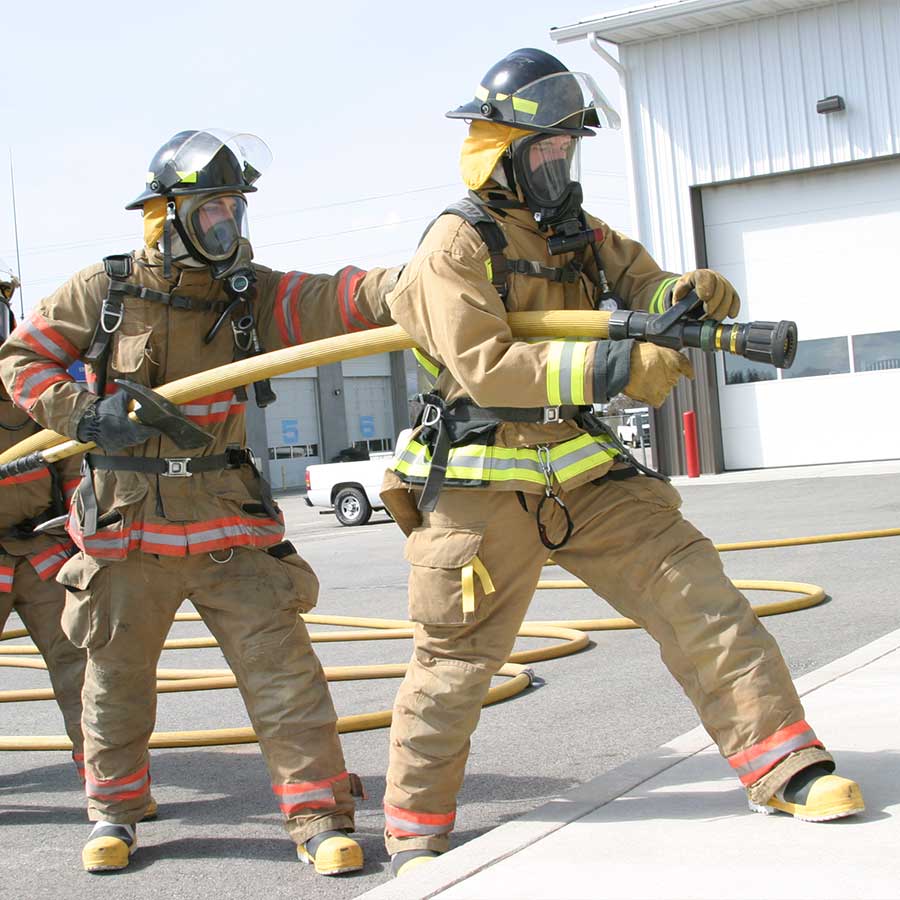Program Description
The term "police" has been defined as a governmental entity whether city county state or national that is relied upon to maintain order keep the peace detect and prevent crime respond to and provide emergency services and enforce criminal law. The North Idaho College (NIC) Law Enforcement program provides professionalism through training to newly hired officers of law enforcement agencies and students seeking employment in law enforcement. The Basic Patrol Academy is designed in a police academy format accredited by the Idaho Peace Officers Standards and Training (P.O.S.T) Council. The academy meets five days per week approximately eight hours per day for one semester. Approximately 45 local law enforcement experts teach more than 60 law enforcement topics sharing a wide array of experience and knowledge with students in the classroom in the mat room in the field skills training and through scenario-based training.
North Idaho College offers three levels of certification in Law Enforcement from which the student may choose: the Basic Technical Certificate which is awarded upon completion of the Basic Patrol Academy the Intermediate Technical Certificate or the Associate of Applied Science (AAS) Degree.
Please see the specific program requirements for each certificate or the AAS degree. To successfully complete the Basic Patrol Academy students will be required to pass all P.O.S.T. requirements for physical fitness marksmanship and P.O.S.T. written field skills and certification tests. Upon successful completion of the Basic Patrol Academy students are eligible to take the P.O.S.T. Challenge Exam for Peace Officer Certification in Idaho.
The North Idaho College Basic Patrol Academy is accredited by the Idaho Peace Officer Standards and Training Council (P.O.S.T.) . Therefore as a selective admissions program there are several admission requirements which include an oral interview entrance assessment background check (to include fingerprint submittal polygraph examination psychological evaluation) and medical vision and hearing examinations. Fees for these tests are the student's responsibility. In addition to the NIC Basic Patrol Academy application P.O.S.T. also requires an application which is submitted online for P.O.S.T. approval to attend. Upon acceptance into the Basic Patrol Academy students will be required to purchase and wear NIC Basic Patrol Academy and physical fitness uniforms while in class.
CERTIFIED LAW ENFORCEMENT PROFESSIONALS Students who successfully complete the Basic Patrol Academy will be given credit for LAWE- 161 LAWE-162 AND LAWE-163.
This is a selective admissions program and applicants will be required to undergo an oral interview, entrance assessment test, a complete background check, including fingerprinting, a polygraph examination, and a psychological evaluation. Applicants must also pass medical, vision, and hearing exams (at the applicant’s expense).
Upon acceptance into the Basic Patrol Academy, students will be required to purchase and wear Academy uniforms while in class.
| Quick Facts: Police and Detectives | |
| 2021 Median Pay | $66,020 per year $31.74 per hour |
| Typical Entry-Level Education | See How to Become One |
| Work Experience in a Related Occupation | See How to Become One |
| On-the-job Training | Moderate-term on-the-job training |
| Number of Jobs, 2021 | 808,200 |
| Job Outlook, 2021-31 | 3% (Slower than average) |
| Employment Change, 2021-31 | 20,600 |
Law Enforcement Basic Technical Certificate Program Outcomes
- Describe the social influence of local communities and how to best deliver police services.
- Describe the criminal justice system and criminal procedures.
- Demonstrate an understanding of the importance of ethics, community relations, crime prevention, professionalism, and other components necessary to build a strong working relationship between police personnel and the community.
- Demonstrate a level of physical conditioning that is appropriate for the performance of a law enforcement officer.
- Demonstrate proper discipline and personal accountability expected in the law enforcement profession.
- Understand and apply principles and procedures for effective communication and human relations with people from varied backgrounds.
- Conduct research and correctly gather, analyze, preserve, and interpret information, artifacts and evidence.
- Through written and physical skills exams, demonstrate knowledge in core competencies and defensive and control skills as mandated by P.O.S.T for entry-level Idaho peace officers.
- Through scenario testing monitored by experienced police officers, demonstrate proficiency in investigative and human relations skills and core competencies as mandated by P.O.S.T for entry-level Idaho peace officers.
Law Enforcement Intermediate Technical Certificate Program Outcomes
In addition to the Basic Technical Certificate outcomes, students will:
- Effectively communicate verbally and in writing in law enforcement and public safety-related contexts.
- Employ computation skills appropriate to the law enforcement profession.
- Recognize and demonstrate first aid skills in a variety of emergency situations.
- Use social science reasoning to inquire, critically consume relevant information, and develop insights on individual, social, community and world problems and questions.
Law Enforcement Associate of Applied Science Program Outcomes
In addition to the completion of the Basic and Intermediate Technical Certificate outcomes, students will study the criminal justice system and the human element as it is related to the criminal justice system. Students will:
- Analyze and understand the history, development, philosophy, and ethics of the American criminal justice system;
- Understand the national and state constitutional guidelines and terminology of the criminal justice system.
- Identify and describe the structure and functions of the main components of the criminal justice system: law enforcement, courts, corrections, and juvenile justice
- Exhibit an understanding of how human elements can affect causes of crime, treatment, and response to the criminal justice system.
General Education Outcomes:
- Communicate effectively, in both written and oral forms, to varied audiences to serve diverse purposes as part of their studies at NIC and beyond.
- Think quantitatively, evaluate data, and draw conclusions using sound mathematical principles and practices.
- Use social science reasoning to inquire, critically consume relevant information, and develop insights on individual, social, community and world problems and questions.
- Schedule, complete, and pass Police Officers Selection Test: Contact Academy Coordinator for appointment. Skills set assessment in Arithmetic, Reading Comprehension and Grammar. *For additional cost a Practice Test or Study Guide can be accessed at Stanard & Associates, Inc. http://www.stanard.com/public-safety/police-test/the-national-police-officer-selection-test
- Complete Physical Readiness assessment to meet or exceed the following: 14" on vertical jump, 15 sit-ups, 21 push-ups, 77.0 sec on 300-meter run, and 17 min 17 sec on 1.5-mile run.
- Complete degree-seeking application to North Idaho College for Law Enforcement AAS for your intended term: www.nic.edu/start
- Complete Financial Aid application: Only if you are self-sponsored students or veterans using the GI Bill. https://studentaid.gov
- Submit two fingerprint cards
- Complete background check application packet (self-sponsors only): Must pass written test first. Academy Coordinator will send you the link.
- Complete pre-employment Polygraph examination: Cost $275 payable to the examiner. Must pass background check to move to this step. The Academy Coordinator will provide contact information.
- Complete Mental Readiness Assessment(optional): At the discretion of the Academy Coordinator or hiring agency. *Cost is variable.
- Complete Medical Examination, vision and hearing tests: Academy Coordinator will provide documents. *Cost is variable.
- Final State approval is required to attend the academy.
- Class Registration: The NIC Registrar’s office will handle registration for all candidates. Once the Academy Coordinator receives his approved list of candidates, registration will be completed and a bill will be generated. You will be able to view amount due in your MyNIC account. If you are agency sponsored a bill will be sent to your agency on your behalf.
Estimated upfront costs are approximately $400-800 depending on optional items*. Kootenai county resident tuition for 2024-25 school year is $3417 which includes course fees of $870 for range, ammo, PT uniform, etc. This is an estimate only and subject to change.
Interested applicants must meet, at a minimum, the following admission requirements to attend the NIC Basic Academies:
- Must be a citizen of the United States and:
- Attain 21st birthday by the end of the Patrol Academy;
- Or 18th birthday by the end of the Detention Academy.
- High school diploma, GED, or 15 academic college credits completed from a S. regionally accredited college.
- Fingerprint clearance by the Idaho State Police and the FBI. A misdemeanor conviction or withheld judgment for any local, state, or federal crime within five years preceding application may be grounds for rejection. A felony conviction or withheld judgement for any local, state, or federal crime must be grounds for rejection.
- Valid driver’s license from the state of residence. No DUI conviction or withheld judgment during the two years immediately preceding application to the Academy.
- No use of cannabis in any of its forms within one year of applying, and no misuse of prescription or other controlled substances within three years of applying.
- If previously in the military, did not receive a “dismissal,” “bad conduct discharge” (BCD), “dishonorable discharge” (DD), or administrative discharge of other than honorable (OTH) from military service.
- Medical examinations completed by a licensed medical physician and the medical forms filled out within the last 12
- Meet or exceed the P.O.S.T. vision and hearing standards as listed on the medical
- Pass the P.O.S.T. Physical Fitness Test on the first day of the Academy.
- Pass a Police Officer Selection written
- Pass a polygraph
- Successfully complete a psychological evaluation conducted by a licensed psychiatrist or clinical psychologist.
1. How long is the Law Enforcement Program?
We hold a Basic Patrol Academy every Fall and Spring semester at the North Idaho College academy in Post Falls. The academy is 16 weeks long.
2. Are there any disqualifiers to entering the program?
Idaho POST has very strict rules regarding acceptance into the program. Those disqualifiers are shown on our main webpage as well as specifically spelled out on our application for attendance.
3. I’m only 19 years old. May I attend the Law Enforcement Program?
Applicants must attain their 20th birthday by the end of the academy. An individual is not allowed to be a police officer in Idaho until they are 21 years of age. Given that, agencies cannot hire anyone until that time. Many agencies have indicated they will send a new police officer back through the academy if there is too much of a time difference between graduating the academy and getting hired. Therefore, this could require the person to attend the academy again, even if the candidate had already graduated the academy.
4. Is the Law Enforcement Program safe?
Yes. Of course, there are inherent risks in anything we do -- participation in the stringent physical fitness program, the Emergency Vehicle Operations Course, handling and shooting firearms, learning and practicing defensive tactics, the Emergency Water Safety class, taser training, defensive aerosol weapons training, and role playing. We strive to make the environment and participation as safe as possible while providing as close to real life training as possible.
5. Where do graduates typically become employed after they graduate?
Law Enforcement Agencies – Upon graduation (which includes passing the Idaho Peace Officer’s Standards and Training (P.O.S.T.) Challenge Exam, recruits are eligible to become a certified law enforcement officer in Idaho after completion of their agency’s field training program and probation. One must apply to P.O.S.T. for certification. Former students have obtained employment in nearly all agencies in north Idaho, many in southern Idaho, the Idaho State Police, and some have moved on to positions in federal law enforcement agencies.
6. Is there a benefit to attending the Law Enforcement Program vs applying to an agency and going to POST?
Yes. Many agencies appreciate and recognize the commitment self-sponsored students demonstrate by putting themselves through the training to become a P.O.S.T. certified officer. Many agencies, to include agencies from Washington and Montana, have recruited from the academy, hoping to hire trained personnel who are ready for the field training program.
7. What are the class hours of the program?
The class hours of the Law Enforcement Program are typically Monday through Friday, 7:45 AM to 5:30 PM. However, some days may run later into the evening as the curriculum requires.
8. Are there physical requirements to enter the program?
Yes. Applicants are required to pass a Physical Readiness Test prior to admittance to the program. The following standards must be met: • Vertical Jump Test – Minimum 14 inches • One Minute Sit-Up Test – Minimum 15 sit-ups • Maximum Push-up Test – Minimum 21 (No Time Limit) • 300 Meter Run – Minimum 77 seconds or less • 1.5 Mile Run/Walk – Minimum 17 minutes 17 seconds or less In addition, applicants must undergo a medical/hearing/vision screening and meet the minimum requirements for entrance prior to admittance to the program.
9. What are the classes like?
Classes are typically taught in a classroom setting where an instructor provides lectures, videos and presentations. For other classes requiring practical skill, students are taught in areas such as: Mat rooms, shooting ranges and in mock scenarios in controlled environments. Additionally, the program uses various training platforms like shooting and driving actual patrol vehicles. Students wear uniforms that are similar to that of law enforcement (agency recruits wear their respective agency uniform) and are expected to follow grooming standards to prepare them for entry to the law enforcement profession.
10. What salary can I expect to make as a police officer or deputy sheriff?
Idaho salaries for police officers and sheriff deputies’ range between $15 to $30 an hour for entry level officers. The profession affords many opportunities for advancement and typically provides benefits such as: • Medical, Dental and Vision Health Coverage • Retirement Programs • Vacation, Sick Leave and other Paid Time Off



